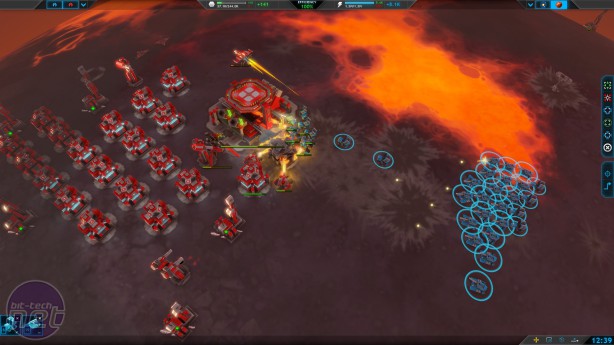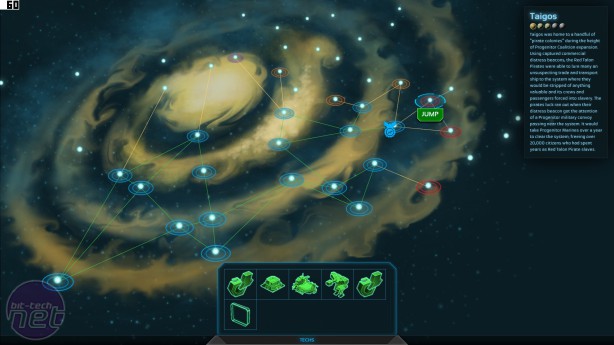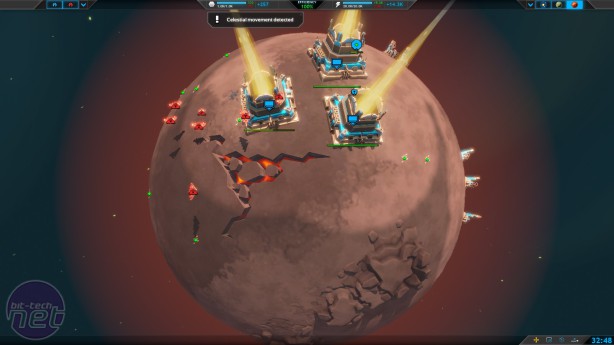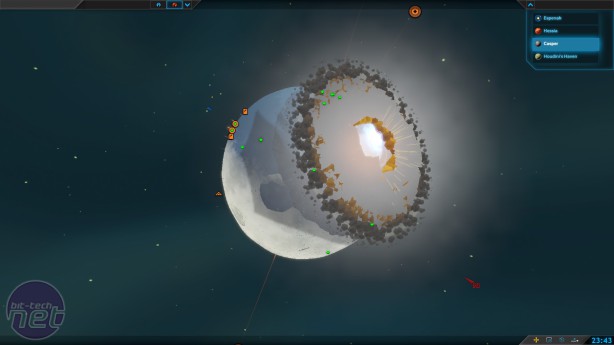
In terms of combat on individual planets, PA is again fairly traditional. Building a huge army and trying to overwhelm the enemy through force of sheer numbers is a perfectly viable strategy, if such a thing counts as a strategy. But factors like terrain and unit type also an important role. Commanders tend to specialise in certain technologies, so you may play a ground-focussed commander battling against one that is dedicated entirely to airborne units. Hence, you’ll need to prioritise building Anti-air units and turrets. Technologies also include naval tech, defensive tech, artillery tech, and so on, so there’s plenty of room for variation.
All of this is well made, but it’s nothing we haven’t seen before. What's more, certainly against other players, matches tend to become about who has the most efficient build order and the largest army. Where Planetary Annihilation gets interesting, however, is in the “planetary” aspect.
Most of the time, commanders will be on different planets separated by millions of kilometres of empty space. Invading another planet is a tricky prospect, and requires some and planning. Transporting a unit between planets requires building an “Orbital” satellite, which can carry a single unit across the void of space. Building sufficient Orbitals to carry an entire army would take hours, so the obvious tactic is to transport a small number of fabrication units to the planet in question, and construct a teleport through which you can send a much larger invasion force.
Trouble is, Commanders also have access to ground and orbital radar, with which they can spot approaching enemy units. So the game becomes about trying to find a blind-spot from which to launch an invasion, or sending enough fabrication units to do the construction very quickly or building some basic defensive structures to protect your teleporter.
Alternatively, you could focus your strategy on a range of super-weapons that can annihilate an opponent in one fell swoop. The Halleys will undoubtedly become the preferred option for many players, but also available are nuclear missiles, anti nuclear missiles, orbital lasers, and others. There is, however, one significant problem, which is that there aren't enough ways to easily move units between planets or initiate combat between them. You can swarm an enemy planet with units or destroy that planet with a colossal superweapon, but there doesn't seem to be anything lying between those two tactics, like interplanetary artillery or, even spaceships. It is a noticeable gap that does limit your options.
Whether you’re playing single or multiplayer, the core game is the same fizzing, spectacular thing. But there are specific alterations made for gaming alone or with friends. In terms of multiplayer, the most interesting is alliances and particularly, dynamic alliances, meaning you can switch sides in the middle of the game, like Game of Thrones, but with robots. You can also build your own solar systems to create more specialised arenas in which you can mutually destroy one another.
If you prefer single-player, there’s the “Galactic War” option, which offers a (slightly) expanded framework for the central game. In brief, you traverse the galaxy over a series of turns, collecting different “techs” to expand your tactical capabilities. To begin with, you only have three tech slots, meaning you have to be very careful about what you select. As you progress, however, you unlock further slots enabling more diverse technological options. Frankly, it's very simplistic. You're never in danger of having the system's you've conquered taken over by the AI, and there's no empire or economy building, no grander strategy to tie together individual battles. It's move, destroy move on. Less of a galactic war and more a galactic clean-up.
I have a few smaller gripes. The inability to save during a game is an annoying omission. It's clearly leant toward multiplayer overall, but matches can go on for an hour or so, and losing that progress in a single-player match is frustrating. Meanwhile, AI is a little too timid on normal and a little too aggressive on hard, so that could do with a tweak.
The lack of strategic diversity in Planetary Annihilation cannot be ignored, and it's unfortunate that a game which is so conceptually brilliant and generally very well designed fails to fully capitalise on that central idea of interplanetary conflict. On the other hand, it is nevertheless an awful lot of fun an awful lot of the time, and I think there's room for a fast-paced, slightly more action-centric RTS at a time when ponderously cerebral 4X games are a dime a dozen. It may not be the smartest strategy game in existence, but when you've got a weaponised planet at your disposal, not many people are going to mock your IQ level.
All of this is well made, but it’s nothing we haven’t seen before. What's more, certainly against other players, matches tend to become about who has the most efficient build order and the largest army. Where Planetary Annihilation gets interesting, however, is in the “planetary” aspect.
Most of the time, commanders will be on different planets separated by millions of kilometres of empty space. Invading another planet is a tricky prospect, and requires some and planning. Transporting a unit between planets requires building an “Orbital” satellite, which can carry a single unit across the void of space. Building sufficient Orbitals to carry an entire army would take hours, so the obvious tactic is to transport a small number of fabrication units to the planet in question, and construct a teleport through which you can send a much larger invasion force.
Trouble is, Commanders also have access to ground and orbital radar, with which they can spot approaching enemy units. So the game becomes about trying to find a blind-spot from which to launch an invasion, or sending enough fabrication units to do the construction very quickly or building some basic defensive structures to protect your teleporter.
Alternatively, you could focus your strategy on a range of super-weapons that can annihilate an opponent in one fell swoop. The Halleys will undoubtedly become the preferred option for many players, but also available are nuclear missiles, anti nuclear missiles, orbital lasers, and others. There is, however, one significant problem, which is that there aren't enough ways to easily move units between planets or initiate combat between them. You can swarm an enemy planet with units or destroy that planet with a colossal superweapon, but there doesn't seem to be anything lying between those two tactics, like interplanetary artillery or, even spaceships. It is a noticeable gap that does limit your options.
Whether you’re playing single or multiplayer, the core game is the same fizzing, spectacular thing. But there are specific alterations made for gaming alone or with friends. In terms of multiplayer, the most interesting is alliances and particularly, dynamic alliances, meaning you can switch sides in the middle of the game, like Game of Thrones, but with robots. You can also build your own solar systems to create more specialised arenas in which you can mutually destroy one another.
If you prefer single-player, there’s the “Galactic War” option, which offers a (slightly) expanded framework for the central game. In brief, you traverse the galaxy over a series of turns, collecting different “techs” to expand your tactical capabilities. To begin with, you only have three tech slots, meaning you have to be very careful about what you select. As you progress, however, you unlock further slots enabling more diverse technological options. Frankly, it's very simplistic. You're never in danger of having the system's you've conquered taken over by the AI, and there's no empire or economy building, no grander strategy to tie together individual battles. It's move, destroy move on. Less of a galactic war and more a galactic clean-up.
I have a few smaller gripes. The inability to save during a game is an annoying omission. It's clearly leant toward multiplayer overall, but matches can go on for an hour or so, and losing that progress in a single-player match is frustrating. Meanwhile, AI is a little too timid on normal and a little too aggressive on hard, so that could do with a tweak.
The lack of strategic diversity in Planetary Annihilation cannot be ignored, and it's unfortunate that a game which is so conceptually brilliant and generally very well designed fails to fully capitalise on that central idea of interplanetary conflict. On the other hand, it is nevertheless an awful lot of fun an awful lot of the time, and I think there's room for a fast-paced, slightly more action-centric RTS at a time when ponderously cerebral 4X games are a dime a dozen. It may not be the smartest strategy game in existence, but when you've got a weaponised planet at your disposal, not many people are going to mock your IQ level.
-
Overall80 / 100


MSI MPG Velox 100R Chassis Review
October 14 2021 | 15:04













Want to comment? Please log in.